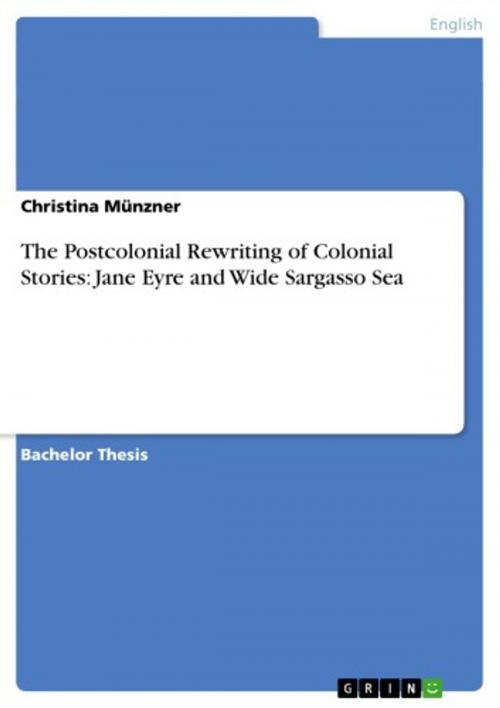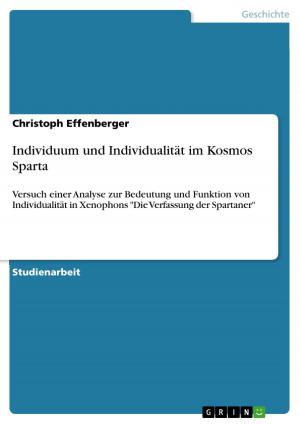The Postcolonial Rewriting of Colonial Stories: Jane Eyre and Wide Sargasso Sea
Fiction & Literature, Literary Theory & Criticism, British| Author: | Christina Münzner | ISBN: | 9783656040989 |
| Publisher: | GRIN Verlag | Publication: | October 28, 2011 |
| Imprint: | GRIN Verlag | Language: | English |
| Author: | Christina Münzner |
| ISBN: | 9783656040989 |
| Publisher: | GRIN Verlag |
| Publication: | October 28, 2011 |
| Imprint: | GRIN Verlag |
| Language: | English |
Bachelor Thesis from the year 2010 in the subject English Language and Literature Studies - Literature, grade: 1,0, University of Leipzig (Institut für Anglistik), language: English, abstract: Charlotte Brontë's novel Jane Eyre was first published in 1847 in London, at a time when British Colonialism was growing increasingly important for both the provision of cheap labour and new markets abroad. The resulting wealth was crucial for Britain's economic rise and rendered possible the Industrial Revolution as well as an increased amount of political and military power over large parts of the world. Many critics have investigated Jane Eyre in feminist or marxist terms, the former because of Jane's astonishing female individuality for the time, and the latter because of the social mobility shown in the novel (Loomba 2005: 74). But since Charlotte Brontë lived during a time when the British Empire was at its peak, her writing was certainly influenced by a colonial belief system which is also present throughout Jane Eyre. [...] Wide Sargasso Sea by Jean Rhys picks up on that notion of the silenced mad woman locked in the attic of an old English manor. Although written in 1966, the novel is widely acknowledged as Jane Eyre's prequel and puts more emphasis on Antoinette's (as named by Rhys) life before she became the wife of a man who is never actually named but is usually identified as Edward Rochester and will be referred to as such in the course of this work. Since the plot of Wide Sargasso Sea starts in Jamaica a few years after the Emancipation Act of 1833, it is historically set in approximately the same time frame as Brontë's text but provides the reader with a much more conscious depiction of colonialist practices and thought. [...] The purpose of this thesis is to examine in which aspects Wide Sargasso Sea can be declared a rewriting of Jane Eyre and what features and characteristics allow the former to stand on its own as a novel. A selection of postcolonial theories will provide the theoretical framework in order to substantiate the propositions that are made.
Bachelor Thesis from the year 2010 in the subject English Language and Literature Studies - Literature, grade: 1,0, University of Leipzig (Institut für Anglistik), language: English, abstract: Charlotte Brontë's novel Jane Eyre was first published in 1847 in London, at a time when British Colonialism was growing increasingly important for both the provision of cheap labour and new markets abroad. The resulting wealth was crucial for Britain's economic rise and rendered possible the Industrial Revolution as well as an increased amount of political and military power over large parts of the world. Many critics have investigated Jane Eyre in feminist or marxist terms, the former because of Jane's astonishing female individuality for the time, and the latter because of the social mobility shown in the novel (Loomba 2005: 74). But since Charlotte Brontë lived during a time when the British Empire was at its peak, her writing was certainly influenced by a colonial belief system which is also present throughout Jane Eyre. [...] Wide Sargasso Sea by Jean Rhys picks up on that notion of the silenced mad woman locked in the attic of an old English manor. Although written in 1966, the novel is widely acknowledged as Jane Eyre's prequel and puts more emphasis on Antoinette's (as named by Rhys) life before she became the wife of a man who is never actually named but is usually identified as Edward Rochester and will be referred to as such in the course of this work. Since the plot of Wide Sargasso Sea starts in Jamaica a few years after the Emancipation Act of 1833, it is historically set in approximately the same time frame as Brontë's text but provides the reader with a much more conscious depiction of colonialist practices and thought. [...] The purpose of this thesis is to examine in which aspects Wide Sargasso Sea can be declared a rewriting of Jane Eyre and what features and characteristics allow the former to stand on its own as a novel. A selection of postcolonial theories will provide the theoretical framework in order to substantiate the propositions that are made.















